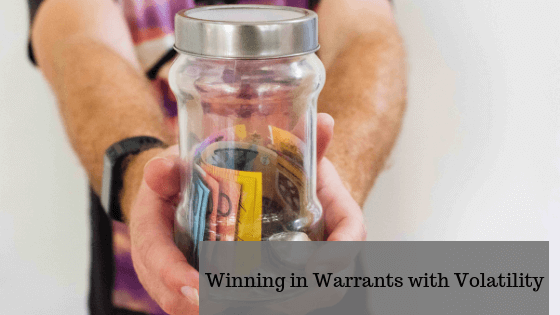
The management team is the real deal.
They have actual employees and have been in business several years.
They have their own coin, which isn’t even factored into the price!
Where should this be valued? Where do you think it settles?
When I started commenting on the Phunware warrants, PHUNW, I received a lot of great questions and comments from traders and investors interested in the stock / warrant.
Huge Moves in Phunware
At the time the stock was going absolutely crazy but the warrants weren’t moving. You could basically buy as many warrants as you wanted under $.50 while the stock went to $500, came back to $90, and then went back to $300.
I wrote several posts about buying the warrants, and that they were undervalued. They’ve gone up 460% as of today’s high, since then. While the common stock has descended from it’s lofty levels.
A normal pattern that I talked about here. (See Nightmare scenario 2, the one thing we know 100% is that the common will drop.)
The Phunware saga is still playing out as I write this. With the registration statement for the warrants still waiting approval from the SEC.
But, let’s go back to why I believed the warrants were undervalued at $.50.
Volatility, Valuation, Volatility
If you’re familiar with option trading and option trading strategies, there’s a huge school of thought that options should never be bought.
Without going into detail, proponents of this school believe you should not pay for premium, but sell it. The argument being that over time this is a winning strategy.
Warrants are a lot like call options with some key differences. One of those differences, as I go over in that post, is that a warrant has a registration statement covering the shares to be issued upon exercise, that must be current.
No registration statement, no exercise. With the result being the warrant is essentially worthless during the time the registration statement is not in place.
BUT, there are times when it’s worth it to take a chance on a warrant, even when there is not a registration statement in place. One of those times is when there is EXTREME VOLATILITY in the common stock.
With Phunware we had a warrant trading at $.50 that was exercisable at $11.50, with a stock trading in the $100s. AND, this is a key point, that warrant has a 5 year term.
To me, that is a pretty good risk/reward scenario.
Now, I did some research into the company, looked at the financials, etc. I exchanged emails with the CFO and CEO, and they appeared extremely professional and on their game.
As a former regulator and consultant to regulators, I do my due diligence, and always have an eye out for chicanery (there’s your vocab word for the day, the use of trickery or dishonest means to achieve some purpose, chicanery).
All of those factors were neutral to positive in my research, which perhaps impacted the size of my long position in the warrants.
But, as a long time professional stock/warrant/option trader, I really don’t care too much what the company does, or whether the management is top notch or the company is run by Tony, my barista at Starbucks (what’s up Tony).
When a stock is experiencing that kind of volatility, as I said in January, $.50 for the warrant was too cheap.
It’s kinda like this. Let’s say you wake up tomorrow morning, and smell smoke in your house, and hear fire truck sirens in the distance. Flo from the Geico commercials happens to be standing by your bed. Flo says, for $1 I’ll provide you with fire insurance for your house for total replacement.
Now, maybe your house is on fire, and maybe it’s not. (Maybe management is good, maybe it’s not.) But dang, I’ll take that $1 offer from Flo every time. That’s some cheap insurance. You’d take that even if your house were definitely NOT on fire.
The volatility impact on valuation is important because it can outweigh other factors. Even if you know nothing about multi-screen as a service (MaaS), can’t tell a bitcoin from a litecoin, and the SEC closes down for a year, this was just a cheap warrant, period.
There’s a great post by James Altucher about Warren Buffet and how he actually made his money. It’s rare that the public is able to “get a deal” on a stock like Buffet does. (See Secret #2 on Getting a Deal in James’ article).
But PHUNW, at $.50, that was a deal.
Want to know how I find deals that move 460% in two months? Here you go.